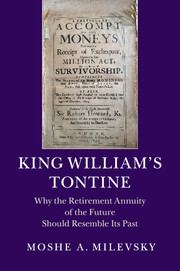Book contents
- Frontmatter
- Epigraph
- Contents
- Preface: In Memoriam for Jared
- Acknowledgments
- 1 King Billy, Protestant Hero of england
- 2 Tontine's Economic Origins: Cheaper Debt
- 3 A Most Curious Will(iam) and Older Than You Think
- 4 The Million Act to Fight a War against France
- 5 Don't Englishmen Die? Anti-Selection vs. Fraud
- 6 Is Your Tontine a Stock or a Bond?
- 7 Optimal Tontine: Hedging (Some) Longevity Risk
- 8 Conclusion: Tontines for the Twenty-First Century
- Epilogue: What Did William Really Know?
- Appendix A The List of Nominees
- Appendix B The Gompertz-Makeham Law of Mortality
- Appendix C 14% for One, 12% for Two, or 10% for Three?
- Source Notes and Guide to Further Reading
- References
- Index
8 - Conclusion: Tontines for the Twenty-First Century
Published online by Cambridge University Press: 05 May 2015
- Frontmatter
- Epigraph
- Contents
- Preface: In Memoriam for Jared
- Acknowledgments
- 1 King Billy, Protestant Hero of england
- 2 Tontine's Economic Origins: Cheaper Debt
- 3 A Most Curious Will(iam) and Older Than You Think
- 4 The Million Act to Fight a War against France
- 5 Don't Englishmen Die? Anti-Selection vs. Fraud
- 6 Is Your Tontine a Stock or a Bond?
- 7 Optimal Tontine: Hedging (Some) Longevity Risk
- 8 Conclusion: Tontines for the Twenty-First Century
- Epilogue: What Did William Really Know?
- Appendix A The List of Nominees
- Appendix B The Gompertz-Makeham Law of Mortality
- Appendix C 14% for One, 12% for Two, or 10% for Three?
- Source Notes and Guide to Further Reading
- References
- Index
Summary
DON'T PROMISE MORE THAN YOU CAN DELIVER
If you want a hassle-free PhD, then retired London School of Economics (LSE) Professor Ragnar Norberg isn't someone you want on your thesis examination committee. In fact, if you are a newly minted academic presenting scientific results at a research seminar, then you probably don't want him in the audience either. Professor Norberg is an old-school Scandinavian actuary in the famed tradition of Filip Lundberg (1876–1965), Harald Cramér (1893–1985), and Thorvald N. Thiele (1838–1910). During his distinguished career he has been a director of the Laboratory for Actuarial Mathematics in Copenhagen, has written more than 100 technical research articles and is the associate editor of many leading scholarly journals in the field. More importantly he doesn't suffer fools lightly and – most delightful and refreshing – he tells it like it is.
Professor Norberg was invited to speak at a conference in Toronto soon after the financial crises of 2008, when risk management failures, economic catastrophes, and financial meltdowns were fresh and pressing on everyone's mind. Intellectually speaking, anything and everything was “on the table.” Financial markets were under attack. Naturally, given his expertise in the field of insurance and actuarial science, he was asked by the organizers to address some of the real-world problems experienced by insurance companies. Household names such as Manulife in Canada, AIG in the United States, and Equitable in the UK (a decade earlier) had been close to the brink as a result of bad risk management – and the audience was eager to hear his views on lessons to be learned from the crisis. Remember, these companies had made financial promises to their policyholders – for example, to pay them a high level of income for life – and were at risk of defaulting on those promises owing to poor risk management.
- Type
- Chapter
- Information
- King William's TontineWhy the Retirement Annuity of the Future Should Resemble its Past, pp. 170 - 197Publisher: Cambridge University PressPrint publication year: 2015



